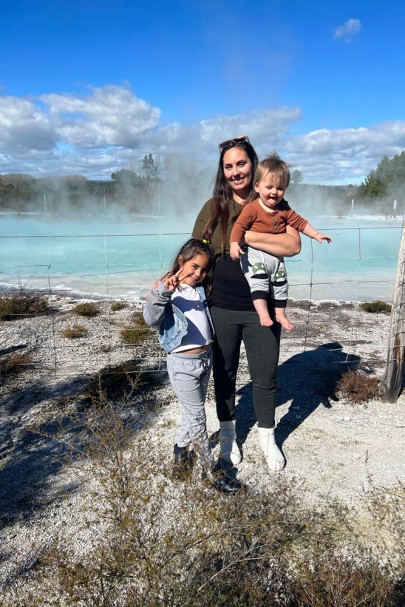
Lara Taylor and her tamariki
As a Māori-Pākehā-Dutch woman passionate about Indigenous and environmental justice and well-being, Lara is advocating for a Te Tiriti o Waitangi framework for water use, based on Te Tiriti (the Māori text) rather than watered-down Treaty principles. She says that means tangata Tiriti remembering that rangatiratanga was guaranteed in Article II of Te Tiriti, and that sovereignty was never ceded, and couldn’t be, under tikanga Māori.
“The Tiriti talks about rangatiratanga or sovereignty over taonga (or resources) which includes freshwater. Rangatiratanga requires control and decision-making power over water use and allocation. However the focus on on water quality distracts us from water access and allocation. There is a lot of nervousness about addressing use rights and who owns water, but water use, allocation, access, and quality all need to be considered together – holistically, which for Māori is consistent with our worldview and values and is what we would consider ‘common sense’.”
“We actually need to go right back to this and redesign our institutions and frameworks so they reflect dual sovereignty.”
In a recently published opinion, Lara says a dual system would be a more equitable one that would empower and enable both tangata whenua and tangata Tiriti (all others who have come here since the first peoples, tāngata whenua, and can call Aotearoa home due to the space provided for them by the Treaty/Te Tiriti o Waitangi signed in 1840 by the British Crown and Māori chiefs) equally.
“The Māori way means we would be caring for our fresh water differently, so we need to establish, in practice, a hierarchy of use. The latest National Policy Statement for Freshwater Management gives effect to this principle, where you look after the river or body of water first, then people, and commercial gains last. The current policy lacks appropriate implementation guidance to ensure that we transition to such as system. Our paper provides a framework and guidance to help agencies, iwi and hapū, with this transition which needs to happen now without further distractions or delays”.
A Tiriti-based system would also confer mana in the respective iwi and hapū that whakapapa to any particular water body, which is also necessary for implementation of the policy which recognises Te Mana o te Wai but not of the people themselves. Recognising and giving effect to the mana of any taonga (resource) requires leadership and engagement of mana whenua (Māori that hold mana over a particular area and taonga) at all levels. Despite ambiguity in the policy itself, which could be interpreted by councils to mean that they can decide how to give effect to Te Mana o te Wai, nobody except mana whenua can articulate Te Mana o te Wai, or how to give that effect”.
Lara says while she is advocating for water allocation rights in this particular paper, the philosophy behind the framework could be applied across all natural resources, and Aotearoa has the opportunity to lead the way globally in creating Indigenous-centred water and land governance and management.
While a whole of system view makes sense, there would need to be compromises and a willingness to re-learn, says Lara. “For non-Māori it’s a completely different way of looking at things where people don’t put themselves first, but they put the land and water first with the understanding that what is at stake is actually the collective wellbeing of ourselves and our future selves.”
For Lara, not achieving water governance and management equity would be a massive disappointment. “Personally, I would really feel like I’ve let down Papatūanuku, my whānau and future generations. If we don’t do something, I worry for the water itself. We are not taking care of it the way we should and not enhancing it or even sustaining it into the future. My fear is that I leave it in a worse state than it is at the moment, and what kind of tipuna would that make me?”